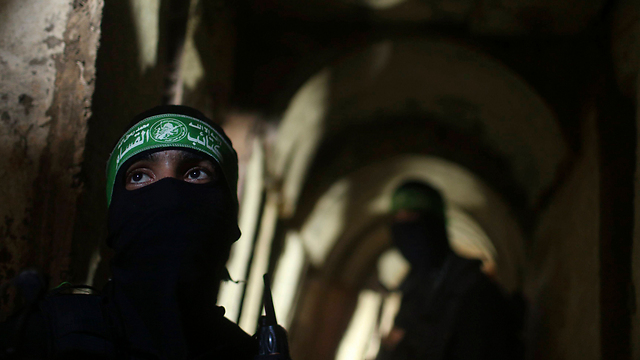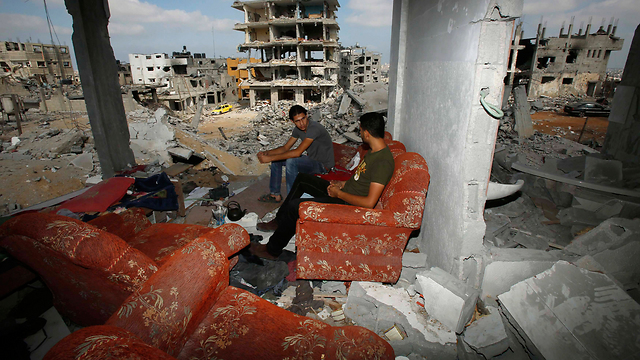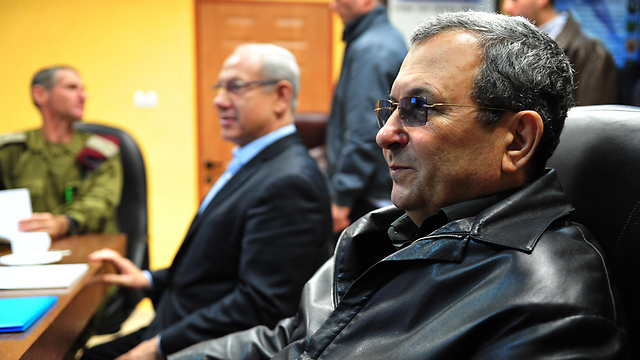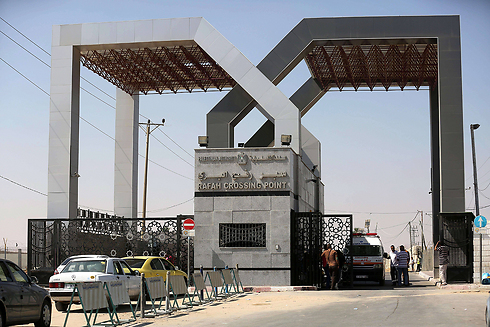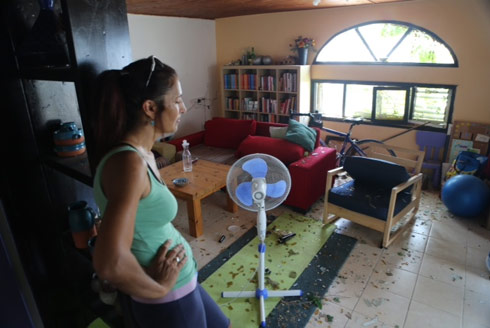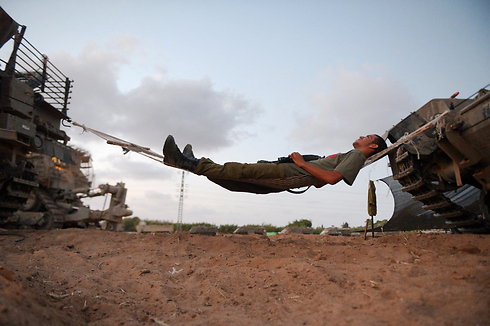
Gaza failure opened door to unprecedented opportunity
Analysis: Years of running on autopilot in Gaza Strip have left Israel in trouble, as confidence in leadership decreased after government hid truth from public. Ron Ben-Yishai explains how strategy for Protective Edge was born and how government can, against all odds, lead to historic turning point.
The talks between Israel and the Palestinians in Cairo, which commenced before the holidays, constitute an almost historic opportunity to positively turn around our unfinished saga with Gaza. No, the discussions will not provide a solution for the conflict with the Palestinians, but they can achieve long-term quiet for south and central Israel. Imagine years without "a drizzle” of rocket fire met with escalation. But first, we must come to terms with the fact that our strategy of launching rounds of "deterrence, agreements and blockades" has gone bankrupt.
This strategy, which was conceived during Ehud Olmert's tenure as prime minister, is based on the assumption that Israel can achieve significant, long-term deterrence against Hamas and terrorist organizations in Gaza. The deterrence should be attained through carefully planned operations, yet limited in time, which the IDF will occasionally carry out; these campaigns will hurt the military capabilities of terrorist groups, kill many of their commanders and field operatives, and weaken them.
The pain and suffering caused to the civilian population is another important element of deterrence. Hamas will be afraid of losing its legitimacy as the ruler of Gaza since it will not be able to provide its residents with physical and mental security, as well as their basic needs. The military achievements will be translated to political "agreements" that would in turn stabilize the situation after the fighting and return calm. The naval blockade and restrictions at land crossings will either prevent or slow down Hamas and the Islamic Jihad's empowerment and will work to extend the periods of quiet between periods of escalation and combat operations.
That is, in a nutshell, the strategy for which then-defense minister Ehud Barak constructed theoretical foundations, and which was supposed to provide the residents of the south with long periods of calm, and a routine of economic and normal life – until eventually, something will happen that may significantly change the Gaza situation and permanently neutralize the Gaza-Hamas cluster bomb. In any case, during this window of time, our political leaders will be able to devote their attention and the country's resources to dealing with the threat of nuclear Iran and the reserves of missiles that Hezbollah and Syria have accumulated.
Unfortunately, all of the estimates and situation assessments on which Israel based its strategy for Gaza have been refuted.
Boomerang
Despite the blockade, the economic hardship in the Gaza Strip, and the blows dealt by the IDF – perhaps even because of them – Hamas retains its control in Gaza and has the support of a significant portion of citizens who have been educated since childhood to hate us. Hamas' military wing, the Izz ad-Din al-Qassam Brigades, has been displaying impressive resilience after every operation and has been continuously able to challenge the IDF.
Our operations have been mostly successful, but as a result, particularly after the Egyptians began destroying the smuggling tunnels, Gazans have learned to develop and manufacture weapons systems and strategies for themselves which were only slightly less effective than those previously provided by Syria and Iran.
The result was challenging. In Operation Protective Edge, while Hamas' military wing didn't succeed in realizing the strategic "surprises" they had prepared, they did deal massive blows, time after time, by using tunnels and mortars to attack the soldiers and towns positioned on the Gaza border, behind the front lines of combat. This is another illustration of the fact that the strategy of rounds of deterrence doesn't only fail to provide residents of the south with security and long-term quiet, but also acts as a boomerang against us from the Palestinian side.
Some negative things are happening on our side as well: "Agreements" have no meaning because of the rogue organizations infringing upon them and because every step has its own meaning that isn't accepted by the other side and acts in a way that leads to further escalation.
Every operation or round of fighting takes lives from us, creates a financial hole, isolates us in the world and angers the West Bank and neighboring nations. If that's not enough - after a clear image of victory fails to appear at the end of every operation - our deterrence before other enemies is gradually being eaten away.
After "Protective Edge", the fourth operation in Gaza in the last decade, residents near Gaza lost the feeling of security and the belief that the country is capable of protecting them. It was mainly due to controversial political decisions that the smuggling tunnels were not destroyed immediately when the fighting began and citizens weren't evacuated from communities hit by mortar fire. More than a few of Israel's citizens now doubt the IDF's ability to defeat terrorist organizations and the politician's ability to lead the nation during a military conflict.
The lesser evil
At the moment, these feeling are made all the harder to understand because the government hasn't held even one deep, strategic discussion in at least two years on how to deal with the challenges posed by the Hamas government in the Gaza Strip. The National Security Council and those leading it issued statements on their positions and suggestions according to which the IDF Planning Branch and Coordinator acted in the field. The Iranian black hole that sucked up our resources, attention, consideration, and the creativity of the security/political leadership, swallowed them all.
What was left was wasted on stagnant peace talks with Mahmoud Abbas and on quarrels with US Secretary of State Kerry and President Obama. Netanyahu and Barack, Netanyahu and Ya'alon, simply put the concept of repeated rounds of fighting on autopilot until the next operation in Gaza without exploring alternatives. The assumption was that there is no political or military alternative that would achieve better results.
The most widely discussed alternative to the current political situation in Gaza is the "strategy of overthrow". This plan essentially means to act as we did against Hamas and Fatah in the West Bank during "Defensive Shield" in the Second Intifada, we will now do to Hamas and Islamic Jihad in Gaza. We could conquer the Strip, but, as we were reminded during Protective Edge, the cost in human life and to our budget during continued control of a civilian population would be too great. Foreign Minister Lieberman remembered to call for the "strategy of overthrow," but Netanyahu, Ya'alon, Gantz, and even Bennett, waved it away - justifiably, it should be noted.
Another alternative to strategic rounds of fighting and agreements is the Palestinian Authority's renewed control of the Gaza Strip under Abbas. This option isn't considered with any seriousness because Abbas can't really handle Hamas militarily and doesn't want to. He isn't interested in being a puppet leader. Even after the announcement two days ago of a power-sharing agreement in Gaza, Hamas and Abbas remain separated on all of the main points: The issue of payment to Hamas government employees, who will control the security forces, who will man the Rafah border crossing etc. The announcement was for Egypt to hear, in order to convince them to open the Rafah border crossing, as well as to those countries giving aid, who've stipulated that funds for reconstruction can only go through the PA.
Some are suggesting that Egypt takes control of the Strip or that a multi-national force enters the area to manage Palestinian affairs by way of a UN mandate until an autonomous Palestinian government is created or Gaza becomes part of Egypt. But this alternative isn't realistic because Egyptian President al-Sisi and the rest of his government aren't ready to even consider the option seriously and neither are foreign nations.
The fourth alternative isn't truly an alternative as it doesn't really change the strategic situation at its core, but it does provide us with an image of victory and deterrence for the long-term, more than what we accomplished in previous operations: A pre-emptive, surprise attack by the IDF on Hamas and other organizations' military capabilities - before the next escalation. This provides the benefit of a short operation with few losses for the IDF. Unfortunately, there would be many thousands of wounded civilians who we wouldn't be able to give the chance to escape for fear of losing the element of surprise. The price would be the loss of international legitimization and the IDF would have to stop and retreat before accomplishing its goals for fear of the sanctions that would be placed on us.
Why we need Hamas
In the absence of a more attractive alternative, it may not be so surprising that Defense Minister Moshe Ya'alon adopted the approach of continuous rounds of deterrence. For his part, Netanyahu was already won over when Barak was his defense minister.
Therefore, in the Cabinet meeting on July 7, during which it was decided to launch Protective Edge, a prepared document was unanimously passed that defined the strategic purpose of the operation: "To significantly hurt Hamas' military abilities and achieve long-term quiet in the entire Palestinian arena (including the West Bank)" - nothing more and nothing less. The collapse of Hamas was never mentioned, neither was the disarmament of Gaza.
This Cabinet decision - which was prepared and formulated in the IDF Planning Branch - is the manifestation of complicated considerations that take into account the disintegration of states and the rising wave of Islam (that's how the rise of jihadist factions of Islam are referred to in the IDF) that is currently shaking the Middle East. "We realized that it's better for the State of Israel at this time to have an effective sovereign state in Gaza," explained a senior source. "We need someone to serve as a recipient of the deterrence we are creating."
"It is in the interest of the State of Israel that someone has effective control of Gaza (so that it won't turn into an area of anarchy like Somalia or Libya), otherwise we'll have to control Gaza. In short: We want an effective sovereign in Gaza that's also militarily weak and deterred," said the source.
The conclusion: We aren't going to overthrow Hamas, only to weaken it.
There were two other major considerations that guided the planners of the operation, and then those who led it. One: To retain international legitimization for combat in Gaza during the operation and to thwart efforts to accuse Israel of war crimes after it. This was the motivation behind the "knock-on-the-roof" procedure, the evacuation of civilians, the presence of population officers among the combat troops, the consideration of legal repercussions when choosing targets, and the immediate compliance with UN and Egyptian requests for humanitarian ceasefires. The price - many more IDF soldiers were wounded during Protective Edge than wanted.
The second consideration was to continue and tighten the cooperation with the government of President al-Sisi in Egypt. The IDF told the Cabinet that the key to preventing another escalation with Hamas after the end of the operation is largely in the hands of Egypt. Al-Sisi's people are also the most desirable partners for Israel in efforts to reach a ceasefire followed by a peace agreement, and Cairo is also the key to moderate Arab countries that have a relationship with them, but not with us.
Therefore, Netanyahu, Ya'alon, Gantz, and the members of the Cabinet agreed to every offer for a ceasefire and even insisted on Egyptian mediation. Indeed, the Egyptians didn't disappoint. Hamas didn't achieve even one of its demands during the talks and had to ask for a ceasefire under humiliating terms. But the direct result of the Egyptians' patience in talks and as a result of the split in the Hamas leadership, the ceasefire negotiations were greatly extended through the last ceasefire.
Recipe for long-term peace
The strategic goal - weakening Hamas and not overthrowing it - and the considerations at its base, were blurred and played down by Netanyahu and Ya'alon in their public appearances, seemingly out of fear of the response from the right in the coalition. A lack of certainty regarding the results the operation was supposed to reach and the militancy of a few politicians and people in the media brought about an increasing lack of satisfaction from the IDF's actions and for the same famous "sourness" and drop in public moral at the end of the fighting.
But today it's already possible to say with some confidence that the IDF acted well, very well even, in carrying out its missions that were part of the strategic purpose decided upon by the Cabinet: Most of Hamas' military capabilities were seriously hit and the organization didn't manage to realize most of the strategic surprises it had prepared. After 50 days of fighting, Hamas was forced to accept a "thinned down" Egyptian ceasefire that didn't provide an answer to any of their demands.
In any case, "long-term stable calm" still isn't a reality. The good news is that this time a real opportunity was created to reach a stable calm. How? Because at the moment we are working with the Egyptians as we've never done before, because of the fact that Arab countries (besides Qatar) see Hamas as a negative element and because Hamas are in desperate need of aid from Abbas and the international community. But to take advantage of this situation, the security apparatus has to calculate a new route: Instead of trying to reach calm through military deterrence and closing off the population, we need to try to achieve the same goal by mixing "soft" and "hard" efforts. How?
1. The "mini Marshal" plan: Massive reconstruction and economic development in the Strip, including lifting most of the restrictions on the freedom of movement and allowing thousands of Gazans to work in Israel - something along the lines of the Marshal plan, whose first and second phases would be implemented immediately without conditions in order to minimize the Gazans' suffering. The rest will come into effect in steps and will depend on the simultaneous implementation of other parts of the plan. Progress will give incentive to the Palestinian people, as well as Hamas (who will profit economically), to keep the ceasefire.
It can also be assumed that with the momentum of construction and economic projects, unemployment will decrease and there will be fewer hands available to dig tunnels and make rockets. National support and the struggle against Israel are very important for Hamas. The organization will lose both if residents of Gaza finally have an income, homes, and freedom of movement - all rights that they won't want to lose.
2. International policing to prevent military conflict: International and Palestinian police forces in cooperation with Israeli and Egyptian forces at the borders will prevent the flow of double-use materials that could be used for the purposes of terror. Inspectors will made sure that building materials, the pipes and fertilizers will arrive directly to the civilian projects for which they are intended. Daily inventory counts will ensure that materials are being used correctly.
3. Secret Israeli actions within Gaza to prevent escalation and an agreement mediated by Egypt on security measures to prevent terror attacks (security agreement). This is in addition to the secret operations that Israel will carry out against smuggling in arms, money, and other combat oriented systems from abroad. Intelligence gathering actions and preventing a military build-up through air sensors and aircraft is not effective enough. We need to act on the ground and underneath the ground on a scale that will have a substantial effect. If we can do this throughout the region, as suggested for foreign reports, there is no reason we can't do this under our own noses.
The freedom of movement that will be given to Gaza's civilians will cause thousands of them to commute between Gaza and the West Bank. This traffic and the accelerated economic development create intelligence gathering opportunities for the Shin Bet and the Egyptians to achieve a level of prevention that we can only dream about in the current situation.
The Prime Minister, Defense Minister, and Cabinet will need to be ready to allow aggressive actions in secret in the Gaza Strip with the knowledge that they are bound to lead to bursts of violence. But it can be assumed that Hamas won't have any interest in escalating the area just because of a few lathes or a rocket storage facility caught fire under suspicious circumstances. The prevention of Hamas' military build-up through secret means in regular intervals is the best deterrence possible - only, of course, if it's successful.
4. Cooperation and aid from the international community and the Arab world. This is where the regional political horizon could come into play that Netanyahu spoke of during the operation, but was quick to forget about in the end. At least in public he didn't mention it since the ceasefire. The reconstruction of the civilian economy in Gaza could serve as an excellent platform to work on Israel's "regional political horizon". That, of course, is assuming that Netanyahu wants to move on the political front that could lead to him accepting a proposal from the Arab League and launching into a new round of peace talks with Abu Mazen. This time the interim agreement would be in force until the wave of jihadist Islam passes.
If such an agreement can be produced in Cairo and the wallets of the countries giving aid can be opened, we will gain not only quiet for a long time (it will take years to rebuild the Strip), but also for the first time we'll be able to effectively prevent the military build-up of Hamas and Islamic Jihad; the alliance with Egypt provides us with a possibility that we've never had in this field. With our help the economic development will give us legitimization to react to violence with a heavy hand, including a ground incursion. What's missing at the moment is only for the Israeli government to sign up for the concept.















